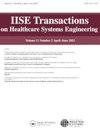理解地方卫生部门追求/推迟认证的决定:一种混合方法系统思维方法
IF 1.5
Q3 HEALTH CARE SCIENCES & SERVICES
IISE Transactions on Healthcare Systems Engineering
Pub Date : 2020-11-23
DOI:10.1080/24725579.2020.1854396
引用次数: 1
摘要
摘要本研究探讨了影响地方卫生部门(LHD)在公共卫生支出较低的州寻求认证的因素。到目前为止,印第安纳州只有三个获得认证的LHD,而且作为一个公共卫生支出较低的州,印第安纳州是探索影响LHD寻求认证决定的可能因素的一个例子。我们使用系统思维方法,通过定量(描述性统计/随机森林)和定性(访谈)方法的混合方法,了解LHD的组织特征,这些特征影响他们寻求认证的决定。我们采访了印第安纳州的12个地方卫生部门,其中6个正在寻求认证,而其他部门则推迟了认证。通过对采访的描述性分析和随机森林变量重要性,我们确定了影响LHD决定的重要组织因素。可变重要性方法将指导信息措施确定为追求认证的最重要因素。指导信息显示了理事实体提供的指导方针是否明确和协调。推行/推迟大型强子对撞机的另一个区别因素是实施措施。与追求大型强子对撞机类似,推迟的大型强子对撞器已经开始了认证的质量改进过程,但在实施阶段活动停止了。理事实体的优先事项和领导能力是成功实施认证的主要驱动力。此外,将认证过程中所需的任务与大型强子对撞机的定期质量改进活动相结合,可能有助于获得认证。本文章由计算机程序翻译,如有差异,请以英文原文为准。
Understanding local health departments decision to pursue/defer accreditation: A mixed-method systems thinking approach
Abstract This study explores factors impacting local health departments (LHDs) decision to pursue accreditation in states with low public health expenditures. With only three accredited LHDs so far and as a state with a low public health expenditure, Indiana serves as an example for exploring possible factors impacting the LHD’s decision to pursue accreditation. We used the systems thinking approach to understand LHDs’ organizational characteristics impacting their decision to pursue accreditation using a mixed-method of quantitative (descriptive statistics/random forests) and qualitative (interviews) approaches. We interviewed 12 local health departments across Indiana, six of which were pursuing accreditation while the others had deferred it. Using the descriptive analysis of the interviews and the random forests variable importance, we identified significant organizational factors that impacted the LHD decision. The variable importance method identified guiding-information measure as the most significant factor for pursuing accreditation. Guiding information shows whether the guidelines provided by the governing entities were clear and coordinated. Another distinguishing factor among the pursuing/deferring LHDs was the implementation measure. Similar to pursuing LHDs, the deferring LHDs had started the quality improvement process for accreditation, but the activities got halted during the implementation phase. The priorities and leadership of the governing entities were the main drivers for the successful implementation of accreditation. Moreover, aligning the tasks required in the accreditation process with the LHDs regular quality improvement activities may facilitate achieving accreditation.
求助全文
通过发布文献求助,成功后即可免费获取论文全文。
去求助
来源期刊

IISE Transactions on Healthcare Systems Engineering
Social Sciences-Safety Research
CiteScore
3.10
自引率
0.00%
发文量
19
期刊介绍:
IISE Transactions on Healthcare Systems Engineering aims to foster the healthcare systems community by publishing high quality papers that have a strong methodological focus and direct applicability to healthcare systems. Published quarterly, the journal supports research that explores: · Healthcare Operations Management · Medical Decision Making · Socio-Technical Systems Analysis related to healthcare · Quality Engineering · Healthcare Informatics · Healthcare Policy We are looking forward to accepting submissions that document the development and use of industrial and systems engineering tools and techniques including: · Healthcare operations research · Healthcare statistics · Healthcare information systems · Healthcare work measurement · Human factors/ergonomics applied to healthcare systems Research that explores the integration of these tools and techniques with those from other engineering and medical disciplines are also featured. We encourage the submission of clinical notes, or practice notes, to show the impact of contributions that will be published. We also encourage authors to collect an impact statement from their clinical partners to show the impact of research in the clinical practices.
 求助内容:
求助内容: 应助结果提醒方式:
应助结果提醒方式:


